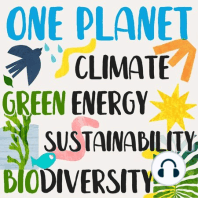20 min listen

Highlights - Carl Safina - Author of “Becoming Wild: How Animal Cultures Raise Families, Create Beauty, and Achieve Peace”
Highlights - Carl Safina - Author of “Becoming Wild: How Animal Cultures Raise Families, Create Beauty, and Achieve Peace”
ratings:
Length:
11 minutes
Released:
Sep 15, 2022
Format:
Podcast episode
Description
"What we call killer whales or orca whales, they travel about 75 miles a day. Where they travel, the visibility is almost never more than about 50 feet, and yet they go to different destinations that may be hundreds of miles apart from where they've been before. And two or three decades after somebody has started to study a particular group, they will see the exact same individuals still together because they recognize their voices in the ocean when they cannot see each other, and they know who is in their group and what group they belong to. And that is not an accident. If a whale is next to the same whale it was next to 30 years ago after traveling thousands of miles in the ocean, it's because they have lives. They're not just bumbling around. They're not just unconsciously swimming forward, gulping down things that they're motivated to eat. They do understand a lot about what they're doing in the moment." Carl Safina’s lyrical non-fiction writing explores how humans are changing the living world, and what the changes mean for non-human beings and for us all. His work has been recognized with MacArthur, Pew, and Guggenheim Fellowships, and his writing has won Orion, Lannan, and National Academies literary awards and the John Burroughs, James Beard, and George Rabb medals. Safina is the inaugural holder of the endowed chair for nature and humanity at Stony Brook University, where he co-chairs the steering committee of the Alan Alda Center for Communicating Science and is founding president of the not-for-profit Safina Center. He hosted the 10-part PBS series Saving the Ocean with Carl Safina. His writing appears in The New York Times, National Geographic, Audubon, CNN.com, National Geographic News, and other publications. He is the author of ten books including the classic Song for the Blue Ocean, as well as New York Times Bestseller Beyond Words: What Animals Think and Feel. His most recent book is Becoming Wild: How Animal Cultures Raise Families, Create Beauty, and Achieve Peace.www.safinacenter.orgwww.carlsafina.orgwww.oneplanetpodcast.orgwww.creativeprocess.info
Released:
Sep 15, 2022
Format:
Podcast episode
Titles in the series (100)
(Highlights) Noah Wilson-Rich · Co-founder/CEO, The Best Bees Company, Largest US Beekeeping service…: Interviewed by Mia Funk & Sydney Field · Associate Podcast Producer Sydney Field by One Planet Podcast · Climate Change, Politics, Sustainability, Environmental Solutions, Renewable Energy, Activism, Biodiversity, Carbon Footprint, Wildlife, Regenerative Agriculture, Circular Economy, Extinction, Net-Zero